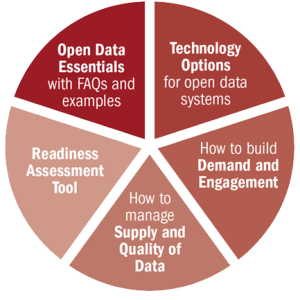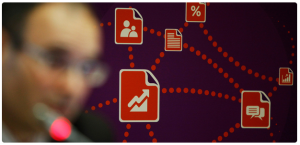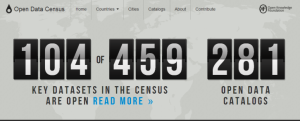The following guest post is by Iulian Pogor (World Bank), Meghan Cook (University at Albany) , Barbara Ubaldi (Organisation for Economic Co-operation and Development– OECD), and Ton Zijlstra (Open Knowledge Foundation) who are among the coordinators of the workshop Open Data Toolkits and Assessment Tools, which will take place at OKCon 2013, as part of the Open Development and Sustainability programme, on Tuesday 17 September. Cross-posted from the OKCon Blog.
OPEN DATA TOOLKITS AND ASSESSMENT TOOLS
A growing network of governments, corporations and civil society organizations around the world are working to expand the availability of open government data by removing technical and legal barriers to data re-use, and engaging the public to unlock the full potential of open data as valuable economic assets and drivers of civic engagement. There are currently hundreds of open data initiatives and a large number of organizations providing assistance to run them. However, the vast majority of them are focused on developed countries and only a few institutions are providing technical assistance to developing countries’ open data initiatives.
The Open Data Toolkits and Assessment Tools workshop to be held on September 17 from 11:30 to 13:15 within the Open Knowledge Conference will present some technical assistance tools and the emerging lessons from implementation of those in developing countries and discuss options for their improvement. The workshop will be broken down in two parts: (i) short presentations and discussion on the World Bank’s Open Government Data Toolkit (by Amparo Ballivian, Chair of the Bank’s Open Government Data Working Group) and the United Nations Guidelines on Open Government Data for Citizen Engagement (by Daniel Dietrich, UN Department of Economic and Social Affairs), and (ii) longer presentations and discussion on the open data readiness assessment methodologies from the World Bank and the Web Foundation (by Tim Davies, Research Coordinator), the Center for Technology in Government (by Meghan Cook, Program Director), OECD (by Barbara Ubaldi, E-Government Unit Project Leader) and the Open Knowledge Foundation (by Ton Zijlstra, Independent Consultant on Change, Complexity, Knowledge Work, Learning) along with the lessons learned from their applications in developing countries. This second session will aim to gather ideas for improvements of these assessment methodologies.
Please see below short descriptions of the respective tools. We invite your feedback regarding the workshop and the tools in the comments section of this post before, during, and after the conference.
 The World Bank Open Government Data Toolkit is designed to help practitioners get “up to speed” in planning and implementing an open government data program, while avoiding common pitfalls. Resources include:
The World Bank Open Government Data Toolkit is designed to help practitioners get “up to speed” in planning and implementing an open government data program, while avoiding common pitfalls. Resources include:
- Open Data Essentials – answers “Frequently Asked Questions” about open data with many examples.
- Technology Options – describes open data scenarios with different levels of complexity, and suggests technical solutions for open data platforms appropriate to each scenario.
- Demand and Engagement – offers a ‘menu’ of services to promote and support ‘Open Data Literacy’, the goal of which is to catalyze, engage, and inspire strategic multi-stakeholder groups to see the value and potential of open data, and what it means for local, national, and regional development in a practical, hands-on way.
- Supply and Quality of Data – discusses basic examples of data quality standards and useful tools to review, refine, clean, analyze, visualize and publish data.
- Readiness Assessment Tool – provides a methodological tool for conducting an action-oriented assessment of the readiness of a government – or even an individual agency – to evaluate, design and implement an Open Data initiative. The tool has been applied in Ulyanovsk (Russia), Antigua and Barbuda, Rwanda, Tanzania and Peru.
 The Guidelines on Open Government Data for Citizen Engagement is a practical and easy-to-understand guideline for policy makers and technologists developed by the UN Public Administration Programme. It can be used to understand, design, implement and sustain open government data initiatives. The toolkit is tailored to the needs and constraints of developing countries, but it can be used by anyone interested in opening up data. It contains the core principles of openness, best practices and case studies, checklists, step-by-step guidelines and practical policy recommendations.
The Guidelines on Open Government Data for Citizen Engagement is a practical and easy-to-understand guideline for policy makers and technologists developed by the UN Public Administration Programme. It can be used to understand, design, implement and sustain open government data initiatives. The toolkit is tailored to the needs and constraints of developing countries, but it can be used by anyone interested in opening up data. It contains the core principles of openness, best practices and case studies, checklists, step-by-step guidelines and practical policy recommendations.
 The Web Foundation has completed initial assessments of two countries’ readiness for implementing open government data programs, in Ghana and in Chile and a third feasibility study is expected to be conducted in Indonesia. Initially, the Web Foundation developed a methodology and a set of composite indicators to define open government data readiness of a given country. These indicators range from political willingness, the public administration readiness, and the civil society interest and readiness. The Web Foundation followed this by conducting research to provide quantitative and qualitative data in preparation for in-country visits, during which the Web Foundation met with key stakeholders to refine the assessment of open government data readiness in their country.
The Web Foundation has completed initial assessments of two countries’ readiness for implementing open government data programs, in Ghana and in Chile and a third feasibility study is expected to be conducted in Indonesia. Initially, the Web Foundation developed a methodology and a set of composite indicators to define open government data readiness of a given country. These indicators range from political willingness, the public administration readiness, and the civil society interest and readiness. The Web Foundation followed this by conducting research to provide quantitative and qualitative data in preparation for in-country visits, during which the Web Foundation met with key stakeholders to refine the assessment of open government data readiness in their country.
 For over 20 years, the Center for Technology in Government (CTG) at State University of New York has developed tools and guides that help governments assess their capabilities, gauge readiness, and inform the design and implementation of open government and open data initiatives. Some selected CTG’s resources to build knowledge and assess readiness include:
For over 20 years, the Center for Technology in Government (CTG) at State University of New York has developed tools and guides that help governments assess their capabilities, gauge readiness, and inform the design and implementation of open government and open data initiatives. Some selected CTG’s resources to build knowledge and assess readiness include:
- A set of resources to conduct a capability assessment that includes presenting a case for the assessment and a methodology to gauge readiness a range of dimensions including organizational, resource, policy, and technological.
- A public value framework and public value assessment tool presents the conceptual model and operational resource to assess the political, social, strategic, economic, ideological, quality of life and stewardship values of open data efforts.
- A practical guide for designing information access programs helps government develop affordable, manageable, and effective information access programs.
- A report, The Dynamics of Opening Government Data presents a case that informs the understanding of how stakeholders and their patterns of interaction, influences or controls the generation, flows, and uses of enhanced information resources in open data initiatives.
Most recently CTG conducted an open government readiness assessment in the Republic of Nigeria using a blended approach of both World Bank and CTG’s tools and techniques.
 The OECD project on Open Government Data (OGD) aims to develop a knowledge base on OGD policies, strategies and initiatives. The ultimate goal of the methodology proposed in the Working Paper on OGD Towards Empirical Analysis of Open Government Data Initiatives is to map practices across the OECD and to identify metrics to evaluate costs and benefits of OGD. This provides a framework for data collection to assess the economic, social and good governance value generated by making government data open, as well as the required conditions for successful implementation of OGD initiatives.
The OECD project on Open Government Data (OGD) aims to develop a knowledge base on OGD policies, strategies and initiatives. The ultimate goal of the methodology proposed in the Working Paper on OGD Towards Empirical Analysis of Open Government Data Initiatives is to map practices across the OECD and to identify metrics to evaluate costs and benefits of OGD. This provides a framework for data collection to assess the economic, social and good governance value generated by making government data open, as well as the required conditions for successful implementation of OGD initiatives.
The assessment will also underlie policy support and capacity building activities to help governments in OECD and developing countries improve the impact of their OGD policies and practices. The assessment methodology includes: (i) An Analytical Framework for examining OGD initiatives, planning and implementation, and (ii) survey data collection on: OGD strategies and policies, implementation of OGD initiatives and portals, value generation and creation of relevant ecosystems, challenges to implementing OGD policies and initiatives.
 The Open Data Census assesses the state of open data around the world. The Census is a community-based effort initiated and coordinated by the Open Knowledge Foundation but with participation from many different groups or individuals. It collects and presents information on the evolution and current state of open data.
The Open Data Census assesses the state of open data around the world. The Census is a community-based effort initiated and coordinated by the Open Knowledge Foundation but with participation from many different groups or individuals. It collects and presents information on the evolution and current state of open data.
This post is by a guest poster. If you would like to write something for the Open Knowledge Foundation blog, please see the submissions page.









World data provider is one of the leading B2B & B2C Business Solutions offering Bulk Email database of facebook , linkedin, property , education and country wise data for your escalating business.
http://www.worlddataprovider.com
Good job with the whole post.
Visit http://www.allenbarron.com